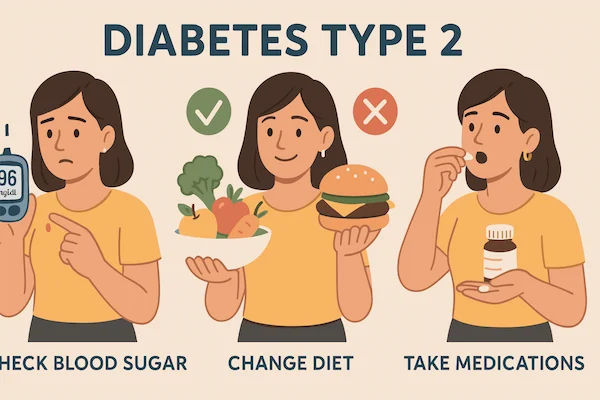Managing Diabetes: A Comprehensive Guide to Nutrition and Exercise
Follow this guide to managing diabetes with a nutritional diet and effective workout strategies. Discover practical tips for designing a diabetic-friendly diet plan and exercise routine to improve overall health.

Written by
Last updated on 13th Jan, 2026
Diabetes is a chronic disease caused by the ineffective production of insulin by the pancreas or by the body's inability to optimally use the insulin produced by the pancreas. In this condition, the ability of cells to take up glucose decreases, which leads to an increase in blood glucose levels.
Though physicians may prescribe medication to control diabetes, diet and exercise can greatly help stabilise blood sugar levels. This guide outlines practical strategies for creating a diabetic-friendly diet and proper exercise routines to control diabetes and improve general health.
The Role of Diet in Managing Diabetes
A person with diabetes must refrain from eating fat-rich, sugar-fortified, and sodium-rich foods like sugary drinks and packaged snacks. Individuals should focus more on healthy carbs, good fats, foods rich in dietary fibre, and fish.
Some ideas to select the right amount of nutrients in the meal include:
The body breaks down carbohydrates into sugars, which increase blood sugar levels. However, consuming healthy carbohydrates, such as fruits, vegetables, and legumes, that are rich in fibre can help moderate the impact of carbohydrates on blood sugar levels.
If taking any medication, carbohydrate counting allows individuals to add the right amount of carbohydrates to their meal plan. It helps them take the right insulin dose.
Understanding portion control is important in planning healthy meals. One can take measuring cups or a weighing scale and find the right portion and quantity of nutrients in the food.
Essential Nutrients to Manage Diabetes
The essential nutrients that one should include in their diet for diabetes management are healthy carbohydrates, lean protein, good fats, and high-fibre foods. The foods recommended include:
Healthy carb sources include fruits, whole grains, and leafy green vegetables. The intake of low-fat dairy foods like milk and cheese should be limited.
Fibre slows down the absorption of sugar in the body, helping to control blood sugar levels. Foods with dietary fibre, such as whole fruits, nuts, and whole grains, can provide the daily fibre intake required.
One must avoid juices and eat whole fruits, as juices are devoid of fibre and raise sugar levels.
Eating salmon, tuna, or sardines containing omega-3 fatty acids that protect heart health can be vital.
For diabetic people, high-protein foods are difficult to digest; thus, they should include lean proteins such as fish, beans, and lean meat.
Foods with good fats include avocados and nuts, which should be included in the diet. Using virgin olive oil and groundnut oil instead of refined oils can be beneficial.
People with diabetes are best advised to avoid saturated fats in animal proteins and high-fat dairy products. Also, they must avoid bad fats, such as trans fats, which can be found in baked and pre-packaged foods.
Developing a Meal Plan for Diabetes
It is vital to create balanced meals to ensure vital nutrients are sustained and to help manage diabetes. There are two ways to make a balanced meal plan:
The carbohydrate counting method requires counting the daily carbohydrate intake to provide the insulin dosage necessary to maintain blood sugar levels. However, carbohydrate counting does not work easily because the amount of carbohydrates consumed varies widely depending on the serving sizes.
The American Diabetes Association suggests the simple plating method, focusing mainly on including more fruits and vegetables. Patients can divide their plate into two halves. One half should consist of an array of green leafy vegetables, and the other should ideally contain an equal portion of lean protein and healthy carbohydrates such as fruits and whole grains.
Exercise and Its Impact on Diabetes
Exercise plays an important role in increasing the sensitivity of cells to insulin in the body. Let's look at the different forms of exercise that should be integrated into the lifestyle of people with diabetes:
One must prepare a workout schedule to stay disciplined and motivated. To get maximum benefits, they must combine strength training and aerobics effectively.
Flexibility and balance exercises like yoga and stretching are ideal when feeling drained or low on energy. They help improve joint mobility and balance.
Exercise increases insulin sensitivity, leading to improved glucose uptake by cells. One must start with moderate workouts and include those activities they enjoy to maintain consistency.
Combining Diet and Exercise for Optimal Control
Proper diet and effective workout routines are important lifestyle changes that help manage diabetes.
To maximise benefits, one should consult a healthcare professional who can tailor a unique plan for diabetes management.
One can use a glucose meter to monitor oneself appropriately before, during, and after exercise sessions and meals.
Based on these indicators, one could decide on the medicines' doses, appropriate food intake, and exercise. The person can adjust the management plan according to their glucose level for effective health control.
Challenges and Tips for Staying on Track
Implementing a diabetes management plan is not always easy. Below are some practical suggestions to keep oneself on track during diabetes:
One can start by making minor changes to their lifestyle and recording any improvements they notice.
Celebrating these small victories will provide a sense of accomplishment, motivating them to stick to their exercise routine.
Inviting a friend to serve as an accountability partner can help ensure daily action.
Instead of intense workouts, focusing on small, enjoyable activities like walking or swimming can reduce friction and make the process feel more manageable and enjoyable.
Common Myths About Diet and Exercise in Diabetes
Some common misunderstandings about diet and exercise are:
People think that eating too much sugar causes diabetes. As per the American Diabetes Association (ADA), eating too much sugar alone doesn’t cause diabetes, but it may be a contributing factor in some cases.
People generally suppose that after they are diagnosed with diabetes, the first step is total carbohydrate withdrawal from their meals. This is misleading because reasonable carbohydrates like leafy greens, whole grains, and rolled oats are recommended.
One also thinks big-time workouts are needed to manage diabetes. Well, no, it isn't true. One can start working out with as few as 30 minutes of walking or biking and build on that.
Conclusion
Diet and exercise are effective complementary tools for managing diabetes. A healthcare professional can design a personalised management plan. With proper guidance and effective strategies, managing diabetes becomes easy and stress-free. By making informed choices and staying consistent, individuals can take control of their health and improve their quality of life.
Consult Top Diabetologist
Consult Top Diabetologist

Dr. Utsa Basu
Diabetologist
14 Years • MBBS , MD
Barasat
Diab-Eat-Ease, Barasat
(75+ Patients)

Dr. S A Mallick
General Physician/ Internal Medicine Specialist
25 Years • MBBS , MD
Kolkata
Dr. S A Mallick's Chamber, Kolkata
(25+ Patients)

Dr. Arif Ahmed
General Physician/ Internal Medicine Specialist
9 Years • MBBS, MD (Genl. Med.)
Kolkata
MCR SUPER SPECIALITY POLY CLINIC & PATHOLOGY, Kolkata

Dr. Arthi S
Family Physician
3 Years • MBBS
Bengaluru
PRESTIGE SHANTHINIKETAN - SOCIETY CLINIC, Bengaluru

Dr. Chevuri Mounika Reddy
Diabetologist
6 Years • M.B.B.S., M.D.General Medicine
Hyderabad
Apollo Sugar Clinic Miyapur, Hyderabad




